The Board is committed to upholding a rigorous risk control system and systematically revises the Company’s risk management model in response to changes in the business environment.
Functions and Composition of the Board of Directors
With the exception of matters reserved for the General Shareholders’ Meeting, the Board of Directors is Logista’s highest decision-making body. Its role is to represent the Company by carrying out all of the activities included in its corporate purpose, as set out in the Articles of Association.
It is the Board’s policy to delegate the everyday management of Logista to the executive bodies and senior management team, focusing its own efforts on its overarching role in determining company strategy and overseeing the work of the senior management team. At the same time, the Board must duly attend to those matters which, pursuant to the law or to the Company’s Articles of Association or Regulations, cannot be delegated to other bodies.
Logista’s Board of Directors includes an Audit and Control Committee and an Appointments and Remuneration Committee, tasked with carrying out those functions required by law. The majority of these committees are made up by Independent Directors.
Composition of the Board of Directors (at 30 September 2020)
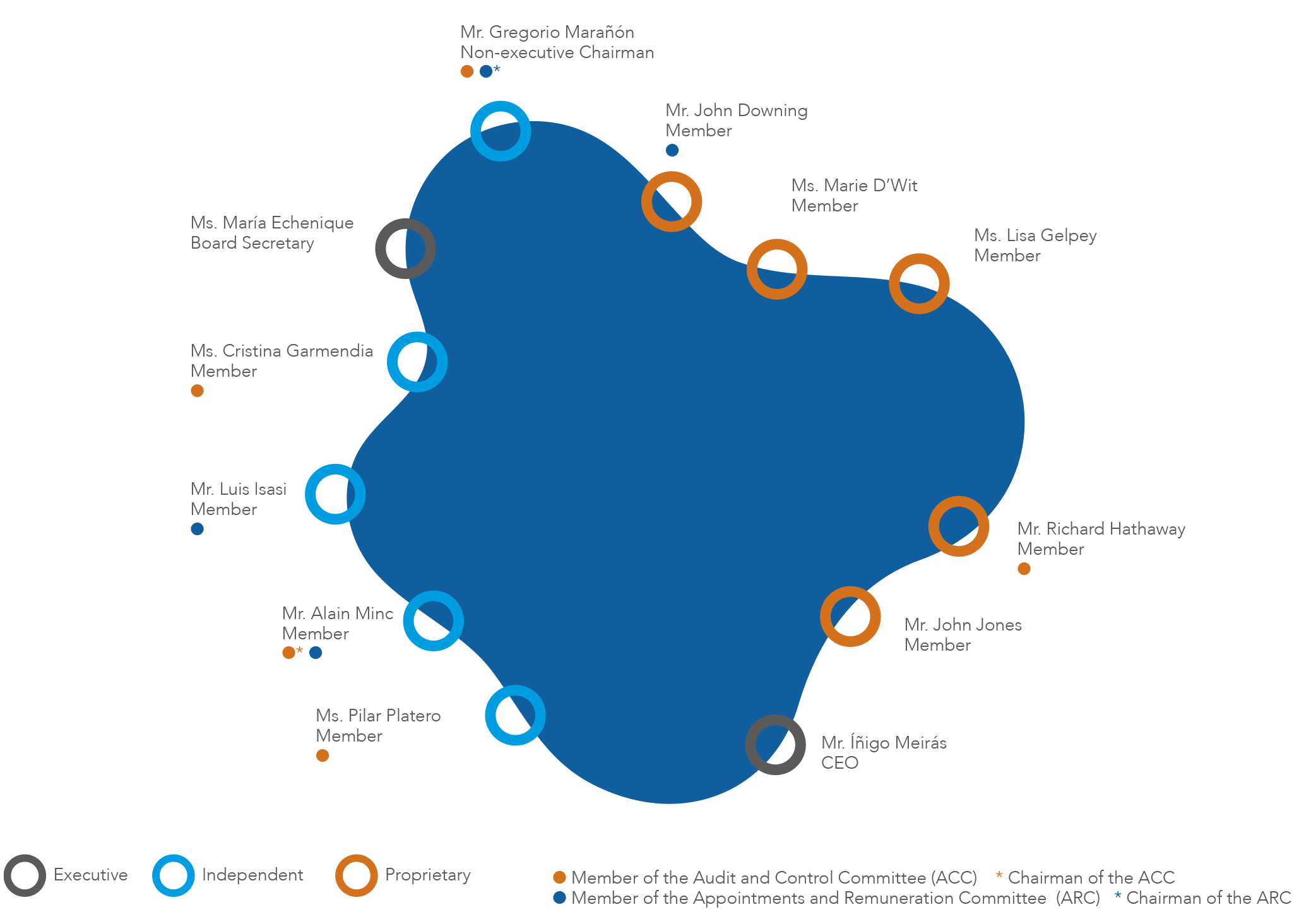
Evaluation of the Board of Directors
In accordance with the recommendations contained in the Good Governance Code for Listed Companies, the Board and its Committees are evaluated on an annual basis to assess the quality and efficacy of their performance. The Chairman of the Board, CEO and Board Secretary are also evaluated as part of this exercise. Every three years, this evaluation is reviewed by an external assessor.
In 2020, the results of the internal evaluation were highly satisfactory. Nonetheless, a number of areas for improvement were brought to light, including the length of sessions and improved communication with Senior Management. The Board of Directors has now produced an Action Plan to support progress in these areas.
Diversity in Board Appointments and Reappointments
In keeping with the Company’s firm commitment to diversity, and thanks to the Appointments and Remuneration Committee’s efforts to advance the issue, the Board is now formed of 12 members, five of whom are women. At over 40%, this exceeds the objective established by the Good Governance Code. The Board reflects a rich diversity of professional and academic backgrounds, with members versed in law, economics, human resources, mathematics, biology and more.
The Company’s Board Selection Policy expressly states that the Appointments and Remuneration Committee must be satisfied that the selection process is free of any implicit biases that may lead to discrimination.
The process of selecting candidates for board positions is based on an evaluation carried out by the Appointments and Remuneration Committee, sometimes in collaboration with an external assessor. This evaluation is based on the principle of diversity in education, professional experience, sector-based knowledge, region of origin (in the case of international groups), etc., with due regard to the requirements established by law and good governance principles for board size and structure. Also taken into consideration are the specialist knowledge needed to fulfil the Board Committees’ specific oversight functions (e.g. accounting, risk management, technology, etc.) and the Group’s commitment to eliminating all forms of gender discrimination.
We would note that, over the course of this financial year, the Board has made progress in this area by approving a skills matrix as an analysis tool for confirming that all of the various competencies it values are sufficiently represented.
The Board is now formed of 12 members, five of whom are women. At over 40%, this exceeds the objective established by the Good Governance Code.
Board of Directors’ Remuneration Model
When determining its Remuneration Policy, the Company has regard to both the relevant regulations (particularly those applicable to listed companies) and to the objectives set out in its Business Plan, which in turn conforms to the principles and recommendations of Good Corporate Governance, best market practices and the guidelines issued by institutional investors and proxy advisors.
Every year, the Company publishes information on Directors’ remuneration in its Integrated Annual Report, Annual Accounts and Annual Report on Remuneration of Directors.
Directors receive a fixed monthly salary plus an attendance allowance paid at a flat rate to all Board members. Committee members receive an additional attendance allowance. Only executive Directors receive performance-related pay.
The current Remuneration Policy, which was drafted with external advice, was approved at the Annual General Shareholders’ Meeting on 24 March 2020. The results of the vote were as follows:
| Number of shares |
Percentage of share capital in attendance |
| In favour: 100,991,278 |
93.1864% |
| Against: 2,230,656 |
2.0583% |
| Blank ballots: 0 |
0.0000% |
| Abstentions: 5,153,585 |
4.7553% |
Agenda for the Annual General Shareholders’ Meeting on 24 March 2020
- Approval of the Annual Accounts (Balance Sheet, Income Statement, Statement of Changes in Equity, Cash Flow Statement and Notes to the Accounts) and Management Report of Compañía de Distribución Integral Logista Holdings, S.A. and the consolidated Group, for the financial year ending 30 September 2019.
- Approval of the consolidated statement on non-financial information for the financial year ending 30 September 2019.
- Approval of the Board of Directors’ management performance during the financial year ending 30 September 2019.
- �Approval of the application of the result for the financial year ending 30 September 2019 of Compañía de Distribución Integral Logista Holdings, S.A.
- Nomination and election of Board members.
- Appointment of Financial Auditors.
- Approval of the Board Remuneration Policy 2020–2022.
- �Scrutiny and approval of the Long-Term Incentive Plan 2020.
- Delegation of Powers to the Board of Directors.
- Advisory vote on the Annual Report on Company Directors’ Remuneration for the financial year ending 30 September 2019.
Tackling corruption and bribery
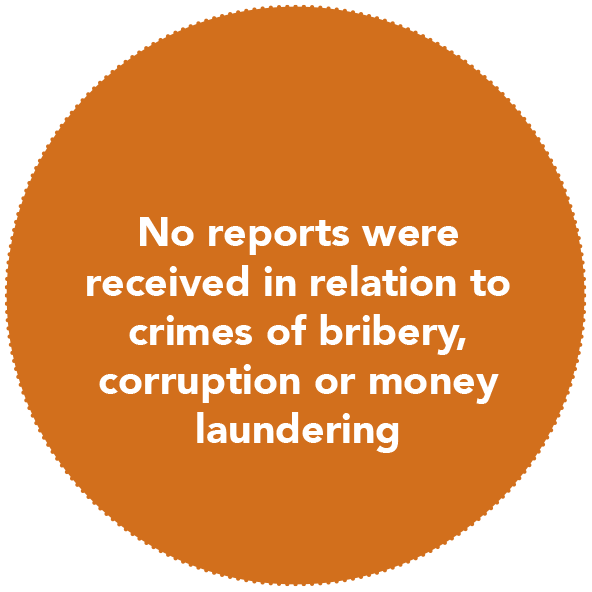
Logista has put in place a number of corporate policies and an internal control system aimed at preventing any conduct falling into the “criminal risks” category, whether on the part of managers, directors, employees or other persons subject to the Group’s supervision. Examples of such criminal conduct include corruption, bribery and money laundering.
Both the Company and its stakeholders take issues relating to ethics and the fight against corruption extremely seriously. The Board of Directors is committed to fulfilling its social responsibilities by adopting all necessary measures to coordinate, oversee and monitor action in response to potential crimes or criminal risks, including those listed below.
- All directors and employees must adhere to the company’s Code of Conduct, which is available on the Group’s Intranet. Among other provisions, this document sets out the procedures to be followed when working with civil servants or government representatives, and prohibits the offering, giving or receiving of payments, gifts or preferential treatment contrary to the law, which may have an influence on the normal course of business, governance or professional relationships or secure an undue advantage for Logista.
- The company’s Criminal Risk Prevention Handbook, approved in 2015, outlines the correct approach to managing and preventing of criminal risk within the Group and the structure and function of the Control and Oversight Unit.
Group employees at all levels are informed of the importance of following the Criminal Risk Prevention Handbook, adopting the principles set out in the Code of Conduct and carrying out their professional tasks in an ethical and diligent manner.
In the event of a breach of the Company’s code of conduct, the relevant employee(s) will be subject to a disciplinary process and possible sanctions. Any incident involving the bribery of a public or private body or the failure to comply with the approved Collection and Payments Management Policy will be treated as grave misconduct.
All Logista employees have access to a Whistleblowing Channel, which can be used to report any criminal action, behaviour or use of information that breaches the Code of Conduct, the General Principles of Conduct or the Criminal Risk Prevention Model.
As was the case in the previous year, no reports were received during the 2020 financial year in relation to crimes of bribery, corruption or money laundering.
The Group’s control framework is reviewed at least once a year by the Internal Audit Department, the Board of Directors and the Audit and Control Committee.
Periodic checks are carried out on any process or activity that could potentially be affected by any of the criminal risks listed above, and the model is revised as necessary whenever the regulatory environment changes. Over the course of the 2020 financial year, the Group’s current Compliance Model was reviewed by the law firm Gómez-Acebo & Pombo, with the aim of analysing the design and structure of the CRPC’s approach (policies and procedures) and updating the Criminal Risk Map.
Contributions to foundations and non-profit organisations in the 2020 financial year came to €447,993 (€188,980 in 2019) the primary beneficiaries being those active in the areas of humanitarian response and social welfare and integration. These funds will be used to improve the quality of life of society’s most vulnerable groups. The majority of these contributions take the form of donations of consumer goods and transport services for the collection, distribution and delivery of food, personal hygiene products, etc., to parishes, social canteens and other frontline support providers.
Human Rights
From its very foundation, Logista has championed a holistic approach to corporate responsibility, based on a distinct set of ethical, business, social, environmental, economic and accountability values. The Group’s Corporate Governance Policy sets out the company’s core values, based on respect as a multicultural Company, commitment to long-term sustainable development, professionalism, integrity and transparency. In all aspects of its work, Logista strives to create, advance and foster a culture and philosophy based on integrity.
This Policy upholds the provisions of the International Labour Organisation (ILO)’s fundamental conventions vis-a-vis freedom of association and the right to collective bargaining, in addition to the OECD’s Guidelines for multinational companies and the United Nations Global Compact.
In compliance with the fundamental ILO conventions on freedom of association and the right to collective bargaining, all Logista employees have signed updated contracts and are represented by works councils and union officials, whom they may freely approach at any time. Various independent unions are active in the Company, and employee representatives are periodically consulted through meetings. The Company ensures that employees are fully aware of their right to collective association, which is fundamental for compliance with ILO provisions.
With regard to preventing Human Rights violations, explicit measures are set out in Logista’s Code of Conduct, General Principles of Conduct for suppliers and the employee Ethics Code. Dedicated reporting mechanisms, such as our Whistleblowing Channel, have also been made available. The Whistleblowing Channel is confidential and will act on any report from an employee or third party who supplies evidence of an act, behaviour or omission amounting to a Human Rights Violation. All reports received are investigated by the Control Unit, which reports three times a year on its inquiries and their outcomes, the current status of the situations investigated and the measures taken to resolve them. This channel complements the Company’s due diligence processes by supporting the identification and resolution of adverse impacts on Human Rights, and particularly of potential cases of child labour.
Logista has implemented various due diligence measures in this area, although given the nature and geographical range of our activities and the robust regulatory framework in place, the Group does not tend to encounter risks associated with the prevention of forced or child labour.
During the 2020 financial year (as was the case in 2019), Logista did not receive any reports of incidents relating to respect for freedom of association and the right to collective bargaining, discrimination in recruitment or employment, forced or coerced labour or any other Human Rights violation or concern in any country in which it operated in this period.
Four communications were received through the complaints channel during the 2020 financial year. After having been studied by the complaints channel committee, 2 of them were inadmissible since the events reported strictly corresponded to an area of labor relations and in 2 of them , an investigation procedure was initiated for alleged malpractices, after which the appropriate measures were taken. The analysis of the aforementioned communications concluded that none was linked to the violation of Human Rights.
The Company’s commitment to complying with the provisions of fundamental ILO conventions and the United Nations Global Compact is reflected in the following documents:
– Code of Conduct: The Code requires the Group’s employees to promote and uphold Human Rights in such a way that they do not contribute, either directly or indirectly, to any kind of Human Rights violation.
Employees work to eradicate any Human Rights violations that may be observed in the labour market, particularly if these are in any way linked to our business activities or supply chain. The Code stipulates that:
- We all have a responsibility to foster a fair, respectful workplace, free of any form of harassment, discrimination or demeaning behaviour. We must ensure that none of our colleagues are subjected to unwanted acts or behaviour on the grounds of age, race, place of origin, gender, sexual orientation, disability, political opinion, religion, marital status or physical or mental health.
- We are all expected to uphold the Company’s commitment to equality of opportunity and to ensuring that appointments are made on merit alone.
- We must all work to promote and defend Human Rights and ensure that we do not contribute, either directly or indirectly, to any form of Human Rights violation. We must work to eradicate any Human Rights violations observed in the labour market, particularly if these are in any way linked to our business activities or supply chain.
- We have a duty to work with our suppliers, licensees, agents and associates to foster and promote the application of the Company’s principles on forced labour and the minimum working age.
- We must not commit or tolerate any form of discrimination against an employee based on the political, religious or legal situation in their country or region of origin. We must ensure that valid work permits are secured as necessary for any employee working outside his or her country of origin.
- We have a responsibility to protect our colleagues’ rights to freedom of thought, conscience, religion, opinion and expression, as established in the “Discrimination and Harassment” section of this Code of Conduct.
- We must not tolerate any form of discrimination arising from an employee’s right to participate freely in the culture of his or her community.
- It is prohibited to employ any person under the age of fifteen, or the minimum working age in the relevant local market, or the legal age for leaving compulsory education – whichever is highest.
– General Recruitment Protocol, Internal Selection Guide and Employee Competence Guidelines: These documents establish a set of general principles for line managers, to be applied in recruitment and candidate selection. They also provide clear guidance on the correct approach, tools and allocation of responsibilities for recruitment, selection, onboarding and performance evaluation, and guidelines for ensuring that posts in all Group Companies are filled by the most qualified candidate.
Logista also promotes gender equality in candidate selection. For example, it is standard practice across the Group that the shortlist of candidates for any post should include at least as many women as men.
– General Principles of Conduct: This document stipulates the minimum standards and requirements for everyday conduct that the Group’s suppliers must observe at all times, both in their dealings with the Group and with respect to their own employees and any third parties involved in their operations.
All of the Group’s suppliers must understand and accept these Behavioural Standards, which are contractually binding on all suppliers who enter into an agreement with a Group Company. The Group may terminate its contractual or business relationship with any supplier that fails to comply with the Behavioural Standards or, in the event of an accidental breach, to take the necessary measures to resolve the situation.
– Group Procurement Guidelines: This document establishes that all suppliers must be duly authorised and have demonstrable financial and technical capacity. Furthermore, all contractual relationships are governed by the Principles of Ethical and Professional Conduct (among others), which states that employees must behave ethically and professionally at all times.
Respect for Human Rights is a material concern for both the company and its main stakeholders, as reflected in the materiality matrix produced by Logista.
Risk and Opportunity Management
An integrated risk management system to support the achievement of the company’s objectives and to further advance its strategy
Logista’s Corporate Risk Management system is outlined in its General Risk Management Policy and Procedures, approved by the Board of Directors on 29 September 2015. These documents were revised on 28 June 2020 in accordance with the 2017 COSO ERM Framework.
They set out the company’s general protocols for controlling and managing all forms of external or internal risk to which Logista may be exposed, at any point in time, in the pursuit of its objectives:
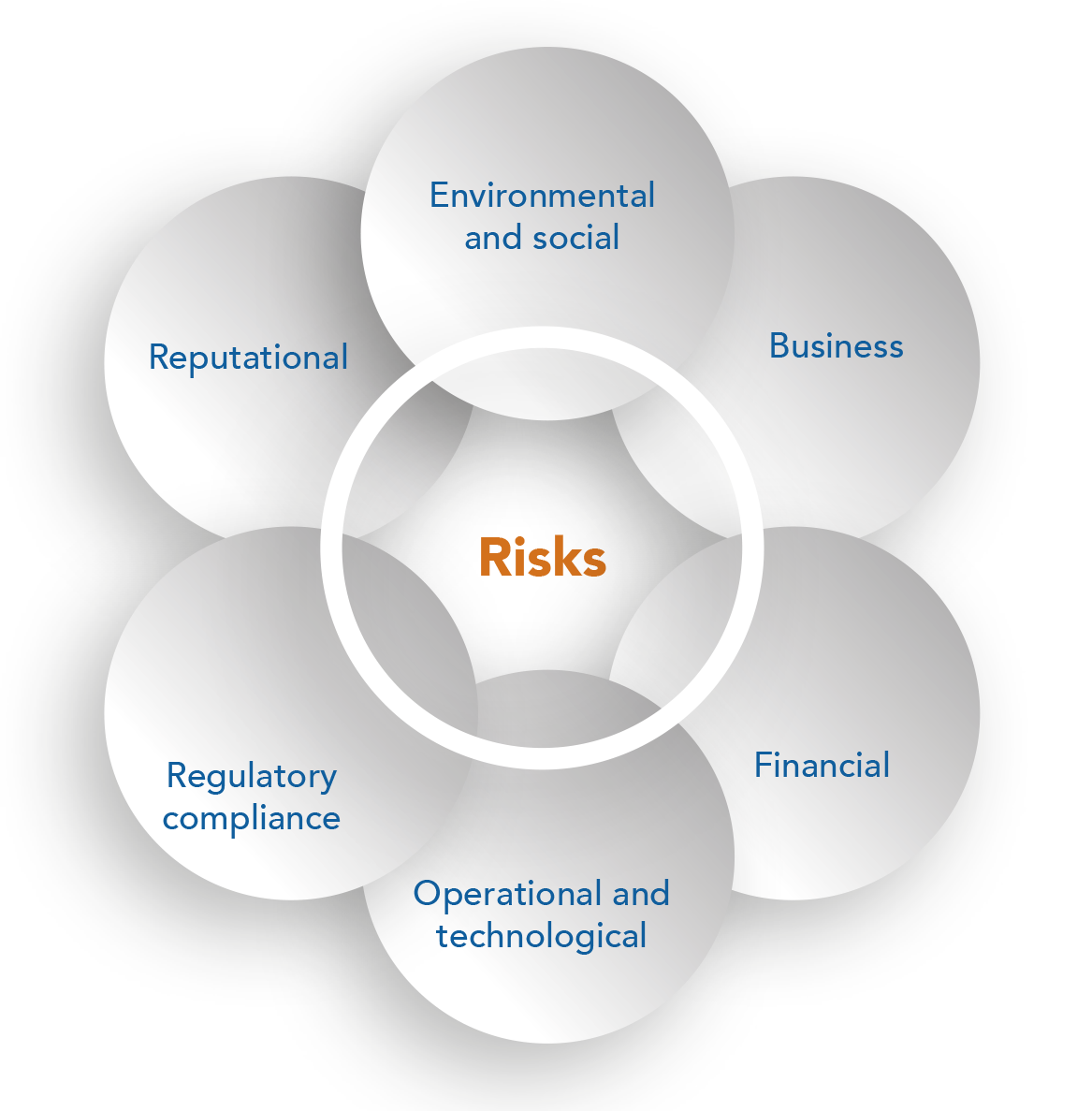
The Policy’s overarching objective is to support the Board of Directors and management teams in their efforts to optimise the Group’s results and ultimately enhance its capacity to create, sustain and realise value.
It applies to every business area, department and country of operation (Spain, France, Italy, Portugal and Poland), thus providing a global overview of all risks that the Group may encounter.
In particular:

Identifying and managing risk across the Group.
Obtaining reasonable assurance that the Group’s objectives can be met.
Participating in and supporting decision-making processes.
Determining risk profile and appetite.
Establishing a common language and methodology with respect to risks.
Facilitating efficient resource allocation.
Ensuring the reliability of financial and non-financial information.
Setting guidelines for transparency and Good Corporate Governance.
Assigning responsibilities to participants.
Expanding the range of available opportunities.
Governing Risk Management
The corporate bodies responsible for devising and implementing the Risk Control and Management System are as follows:
The Board of Directors
In accordance with its regulations, the Board of Directors has a non-delegable duty to approve all of the Group’s overarching polices and strategies, including the risk control and management policy (which extends to fiscal risks), and to oversee all internal information and control mechanisms, particularly those that handle financial information.
The Audit and Control Committee
The Audit and Control Committee’s regulations establish its role in overseeing risk control and management, reviewing the efficacy of the Company’s risk management systems and supervising the risk control and management unit.
Internal Control Committee
One of this Committee’s essential roles is to lead and coordinate the annual update of the Group’s risk map and submit it for approval to the relevant bodies.
Internal Audit Department
The Internal Audit Department is responsible for determining the Group’s processes and criteria for Risk Management, producing and periodically updating its Risk Map and submitting regular reports to the Audit and Control Committee, which in turn conveys them to the Board. These reports are intended to highlight any emerging risks or new developments pertaining to identified risks and to provide information on the progress of approved action plans and the general performance of the Group’s Risk Management System. They should also identify any materialised risks.
Process Officers
This includes all employees responsible for the design and development of the process and for identifying any risks or opportunities it may encounter. Their role is to identify Procedural Risks and the Internal Control Actions to be carried out in order to prevent or mitigate them. They are also required to track the progress of these actions and to provide support and information to the Internal Control Coordinators.
Internal Control Coordinators
The Internal Control Coordinators are responsible for advancing the adoption, development and coordination of the Internal Control System. As a general rule, this role is allocated to financial managers in charge of business areas or departments.
Control Officers
Control Officers carry out the Control Activities defined in the Internal Control System, reporting to the Process Officer. Where applicable, they should suggest improvements and corrective action aimed at enhancing the design and efficacy of Control Activities. They are required to follow the relevant Risk Management guidelines at all times.
Process for identifying, evaluating and mitigating risks
Logista’s risk management process is based on the following framework:
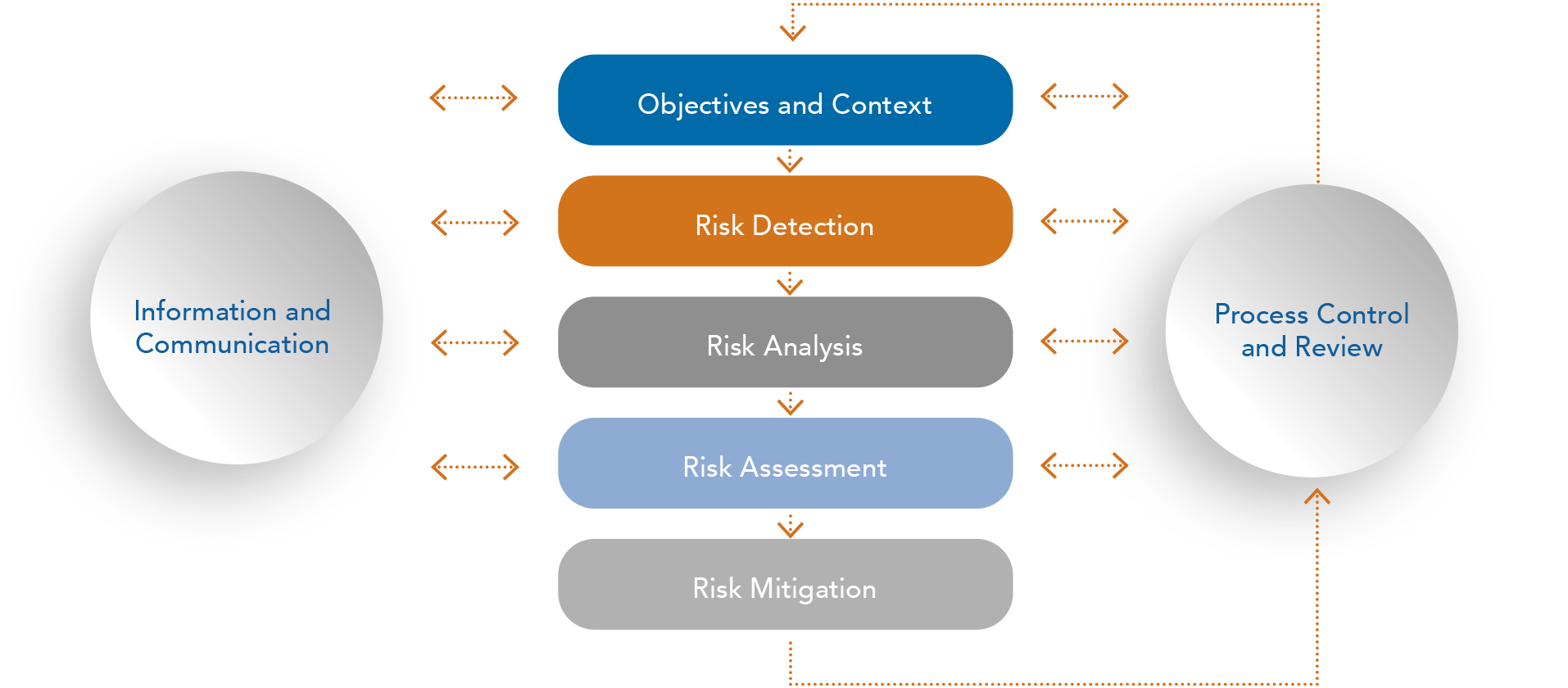
Objectives and Context
Logista determines its strategic objectives and operational scope, both internally and externally, with due regard to stakeholder interests. In turn, this perspective has an influence on its risk management approach. The Company also defines its risk appetite, i.e. the level of risk it is willing to accept in the course of its activities. Broadly speaking, risk appetite is categorised as follows:
Low
risk
tolerance
profile
- Logista seeks to comply with all laws, regulations, standards and tax rules to which it is subject.
Moderate
risk
tolerance
profile
- Towards risks that do not threaten the Group’s capacity to:
- achieve its strategic objectives while limiting uncertainty;
- �maintain the strongest possible shareholder guarantee;
- protect its results and reputation;
- defend the interests of its shareholders, clients and manufacturers.
Higher
risk
tolerance
profile
- Towards plausible technological risks, given that the Group’s strategic objectives include providing logistics services with high added value and, therefore, involving advanced technological solutions.
These baselines for risk appetite are a tool for achieving the optimum balance between risk and opportunity.
Risk Detection
Risk detection refers to the identification of future events that could potentially pose a threat to the Group’s objectives, whether through interviews or self-assessment questionnaires.
Risk Analysis
All risks must be recorded in such a way that they can be readily understood and, especially, used to facilitate decision-making. Each risk should be defined by reference to its causes and contributing factors, as well as the consequences for the Group were it to materialise.
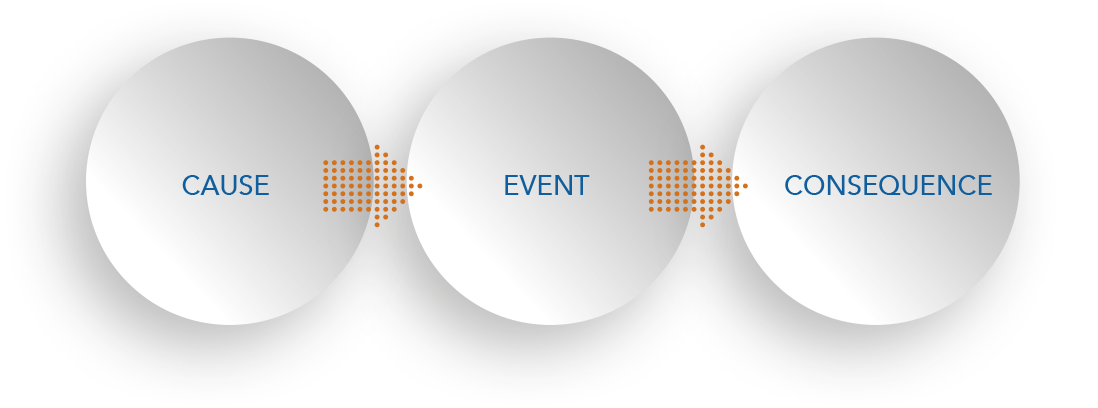
Risk Assessment
During this stage, the severity of each risk is assessed in order to prioritise those of greatest concern. The criteria used to explore potential impacts on the Group are: regulatory compliance, economic/financial, health and safety, operations, reputation and strategic context.
A parallel assessment looks at the mitigation measures adopted by the Group in response to the identified risks, to derive what is referred to as the “residual risk”. This exercise also evaluates the speed with which the risk could potentially materialise, which determines its ranking in the overall risk appetite framework.
Risk Mitigation
The Group’s response to the risk is analysed and categorised according to the following response types:
- Eliminate: take all possible measures to negate the likelihood of the risk occurring and/or its impact, so that the risk effectively disappears or is eliminated.
- Mitigate: take any necessary action to lessen the potential consequences should the risk materialise.
- Transfer: assign the consequences associated with the risk, should it materialise, to a third party.
- �Accept: take no action, absorbing the potential consequences should the risk materialise.
- Pursue: accept a greater degree of risk where offset by a potential performance gain. When choosing to pursue a risk, managers must understand the nature and scope of any changes required to achieve the desired performance gain without exceeding the acceptable limits of tolerance.
Action plans should then be put in place.

All actors implicated in the Group’s Risk Management Model are required to store and manage relevant information through tools such as the Risk Register and the Risk Map. Twice a year, the Audit and Control Committee carries out a review of material risks, response strategies and mitigation plans, including those relating to fiscal matters, before approving and distributing the Group’s Updated Risk Map. In the two quarters when this full review does not take place, the Audit and Control Committee is informed of the most significant developments in relation to material risks. This mechanism allows for the identification of new threats and for sufficient advance warning for effective Risk management. The Committee submits quarterly reports on its work in overseeing the Risk Control and Management System to the Board of Directors. In this way, the Group seeks to foster an appropriate setting and philosophy for risk management, through targeted communication with both the Audit and Control Committee and the Senior Management Team.
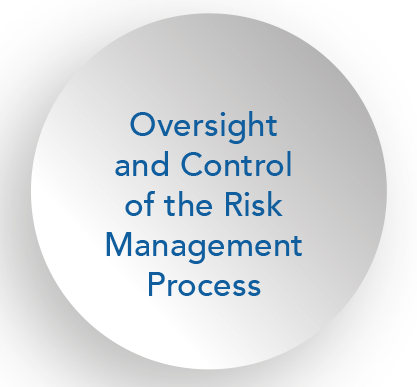
The risk management process is continuously monitored and revised, with a particular focus on emerging risks, the ongoing development of known risks, obsolete risks and materialised risks.
Breakdown of material risks
The Corporate Risk Map (among other documents) identifies the following risks, which are categorised in accordance with the framework set out in the General Risk Management Policy:
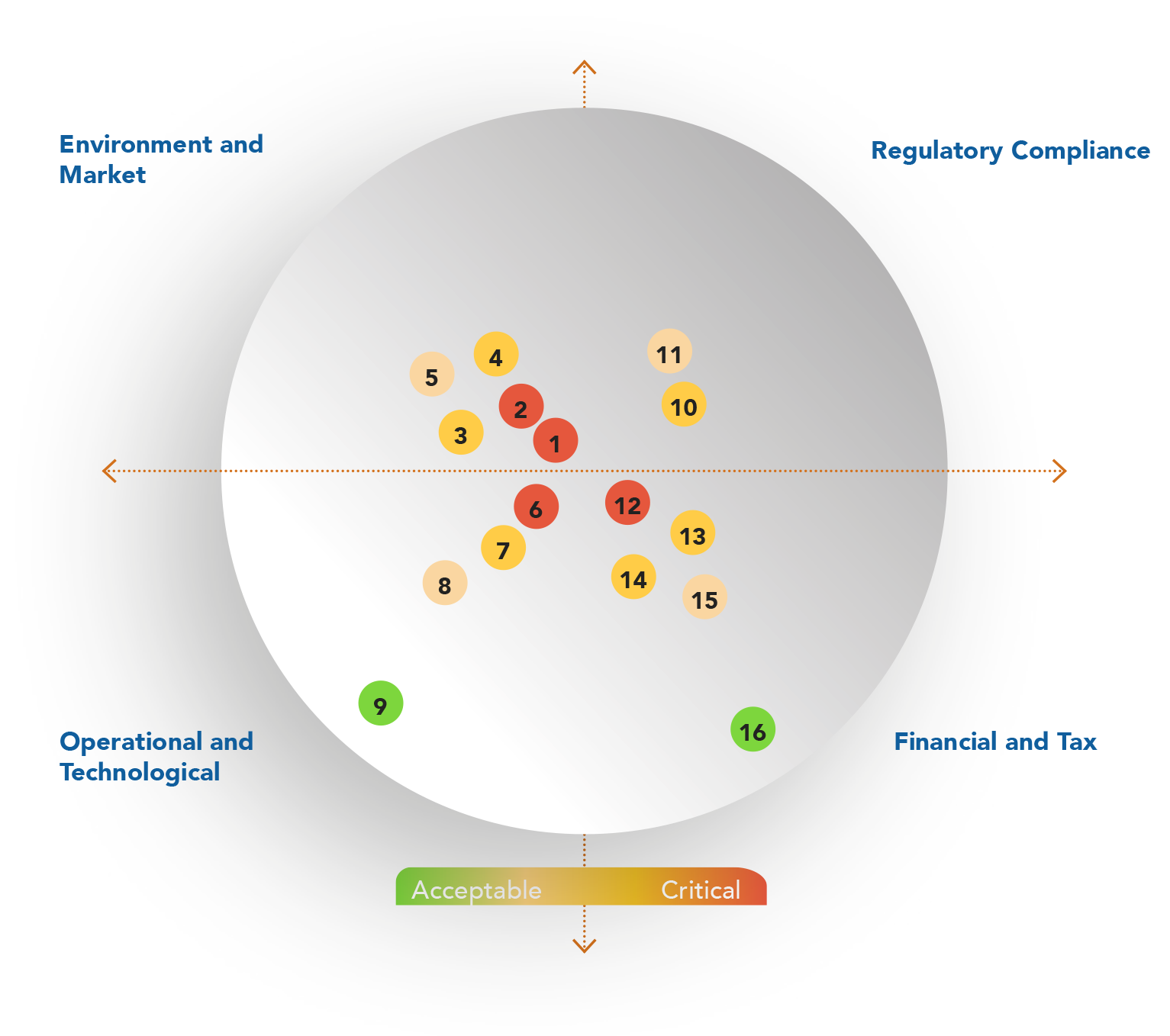
| Tipo de riesgo |
Descripción |
Nivel de riesgo |
Planes de respuesta |
| Riesgos de Entorno y Negocio: |
| 1COVID-19 pandemic and its impacts |
The current global context is dominated by the COVID-19 pandemic, which has been particularly severe in countries where Logista has the greatest presence. There has been a generalised decline in the macroeconomic outlook, particularly with respect to employment, consumer spending and economic growth, leading to a general recession that may have an impact on Logista’s business operations. |
Critical |
In response to the circumstances created by the COVID-19 crisis, Logista has adapted its operational practices and revised its strategic and business plans. Corrective and contingency measures have been put in place and various steps taken to support business continuity. As a result, Logista has been able to continue operating while introducing a range of measures to protect its employees and partners.
Further details on Logista’s pandemic response measures can be found in the following sections: Creating Value for Shareholders and Investors (measures affecting shareholders and investors); Employee Development (plans implemented to protect employees) and Customer satisfaction (examples of new services developed in response to client needs during the pandemic). |
| 2Macro-economic, political and social environment and changing consumer habits |
Various business activities within the geographical range of Logista’s operations may be affected by changes in political, social and/or macroeconomic conditions, both at the global level and, in particular, in Spain, France, Italy, Portugal or Poland. The Group may become subject to new regulations or be affected by structural changes that reduce clients’ purchasing power. Similarly, changes in consumer habits and patterns may have an impact on its business performance. |
Critical |
Logista continuously monitors the progression of its various business activities and any developments in the regulatory, social and political environment, adapting its strategy and objectives to changing conditions in its countries of operation. |
| 3Market liberalisation |
Moves to promote further market liberalisation in countries where Logista acts as an authorised distributor for tobacco products in the context of a state retail monopoly could have an impact on the Group’s results if it fails to take certain measures, which have already been identified. |
Serious |
The consequences of market liberalisation in the Group’s main target markets, where it acts as an authorised distributor for tobacco products in the context of a state retail monopoly, may adversely affect its profits. However, such effects would be mitigated by the Group’s capacity to distribute tobacco through an extensive network of outlets and its pursuit of a diversification strategy. |
| 4Accelerated decline in the tobacco market |
In light of new anti-smoking policies adopted by national governments in target markets or at EU level, changes in consumer habits and significant hikes in taxes or retail prices, there is a risk that the tobacco market will shrink at a faster rate, while trade in counterfeit products will increase. The Group may not be in a position to compensate this loss through growth in other business areas, such as convenience products or pharmaceuticals. |
Serious |
Diversification plan, as established in Logista’s strategic plan. |
| 5The illicit tobacco trade |
As a result of the economic crisis and a rise in unemployment, there is a risk that illicit trade in tobacco and counterfeit tobacco products will become significantly more prevalent. This could have an adverse effect on the volume of tobacco products distributed by Logista. |
Relevant |
Product traceability is now subject to more rigorous protocols, as required by Directive 2014/40/EU of the European Parliament and of the Council of 3 April 2014. This directive establishes stricter standards in relation to labelling, ingredients, traceability and cross-border sales, among other aspects, which could have a bearing on the volume of tobacco sold. All EU member states in which the Group operates have already transposed the Directive into their national legislation.
Logista cooperates with national law enforcement and security forces to tackle illicit trade. |
| Operational and Technological Risks |
| 6Cybersecurity |
Deliberate third-party attacks can undermine the operations of corporations and industries. The Group is exposed to various threats and vulnerabilities due to its highly digitalised systems and daily use of technology and information systems across its various business activities. This presents a risk to information security and to system continuity, and may lead to privacy breaches, information loss or the theft or fraudulent use of data. |
Critical |
The company has developed a Cybersecurity Plan, which should be regularly updated. This document sets out specific measures to counter these risks, such as external and internal intrusion testing, preventative digital monitoring and checks on the level of service delivered by providers contracted to manage and administer the Group’s IT infrastructure. |
| 7Risk of theft |
Theft of tobacco from the Company’s facilities or during transport may result in higher insurance premiums. |
Serious |
Adopting the most rigorous security standards possible and taking out Insurance Policies reduce both the likelihood of theft and the impact on tolerable risk levels. |
| 8Availability of information systems and business continuity |
There is a risk that a shock event could paralyse the company’s operations, or that the business continuity plans designed to ensure a timely and appropriate disaster response fail to make provisions for the continued availability of Information Systems and the level of service they routinely provide. |
Relevant |
Contingency plans should be in place and periodically tested to assess their effectiveness. The Group should continuously monitor the levels of service delivered by providers contracted to manage and administer its IT infrastructure. |
| 9Environmental standards |
There is growing client demand for services that meet certain environmental standards. In this respect, Logista has developed a Quality and Environment Master Plan and a Quality, Environment and Energy Efficiency Policy that establish guidelines and good practices for optimising the use of resources and preventing pollution throughout its business processes. Pursuant to the ISO 14064 standard, the Group calculates its carbon footprint using the methodology set out in the GHG Protocol. |
Acceptable |
Logista’s efforts in this area have won recognition from several international bodies. CDP, for example, has included Logista in its prestigious “A List” as a global leader in the fight against climate change – the only European distribution company to have achieved this recognition in the last four years. |
| Regulatory Compliance Risks |
| 10Regulatory risk |
The Group’s business activities are subject to compliance with numerous laws and regulations, both general and sectoral. These may apply at the European, national, regional and local levels in any country of operation. This exposes the Group to risks arising from potential breaches, associated sanctions or legal claims and increased costs of verifying and controlling regulatory compliance. |
Serious |
Logista continuously monitors the regulatory and legislative environment for changes that may affect its activities, aiming to anticipate such changes as early as possible to allow for effective management. The Group has also produced an assortment of specific standards and procedures to govern its framework for action, in addition to criminal risk prevention models for each Group Company. These measures reflect a “zero-tolerance” approach to fraud and corruption.
The Corporate Legal Advice Department coordinates a review of the Group’s most significant contracts to ensure strict legal compliance. |
| 11Legal Action |
In the normal course of its business, Logista may become involved in legal disputes, either as the claimant or as the defendant. These may arise from differences in the interpretation of laws, regulations or contracts or from the bringing of legal actions, the outcomes of which are uncertain by nature. |
Relevant |
Establishment of specific standards and procedures to govern the Group’s framework for action, in addition to criminal risk prevention models for each Group Company.
Legal defence and procedures for managing and monitoring legal actions, with external expert advice as appropriate. |
| Financial and Tax Risks |
| 12Changes to the Group’s payment cycles or to fiscal policy |
Like any other wholesale business, Logista’s purchasing and revenue cycles are staggered. This means that outgoings to tobacco manufacturers and incomings from retail outlets may not always be in balance. Moreover, Logista’s tax obligations must be settled according to a different cycle again.
Changes to the tax payment cycle or significant tax rises (in VAT or excise duties, for example) could have a negative impact on the business by weakening the financial outlook, thus affecting the Group’s operating profit and cash management. |
Critical |
Changes to the Group’s payment cycles could force it to seek external financing in order to meet its obligations.
The Group is in the process of developing more robust mechanisms for debt collection, with a view to shortening collection periods in markets most vulnerable to an economic slowdown and business areas most exposed to client credit risk. In addition, it is lowering the credit limits extended, monitoring credit lines more closely and seeking bank guarantees. |
| 13Annual accounts subject to audits and inspections |
The Group’s primary activity is the distribution of tobacco, and as such it is subject to a specific fiscal model that can be complex due to its extensive geographical presence. In this respect, the Group has various tax disputes pending resolution requiring value judgements as to the probability of being obliged to settle certain liabilities. Logista has made provisions for these risks based on expert legal advice and the potential for transferring them to third parties.
In accordance with current legislation, tax assessments are not considered definitive until the filed returns have been inspected by the tax authorities or the four-year inspection period has lapsed. Currently, the Group’s returns from a number of financial years are subject to inspection with respect to certain taxes. |
Serious |
In discharging its fiscal obligations, the Company advocates strict compliance with all applicable tax requirements. It adopts a centralised approach to monitoring and verification, ensuring that all fiscal obligations across the Group are met. To this end, it draws on support from highly reputable tax advisors and law firms when preparing its tax reports and settling taxes owed. Such advice is also sought in the event of any special transactions and when mounting a legal defence of the Group’s position, should this be necessary. |
| 14Fair value impairment losses on assets, investments, goodwill and asset provisions |
One of the Finance Department’s basic objectives is to preserve the value of the Group’s assets in every business unit and country of operation. It does this by analysing and preventing risks and optimising the management of the main claims. Nevertheless, there is a risk that the fair value of assets may deteriorate, particularly with respect to the carrying value of goodwill, which is high. This is because the Group has a significant volume of assets and investments that have a substantial impact on its income statement. |
Serious |
The Finance Department analyses potential accidental risks to which Logista may be exposed, both in its asset holdings and in the course of its business activities. Accordingly, it ensures that external insurance policies are in place as appropriate and commissions real estate asset valuations. With respect to the high carrying value of goodwill, the Group carries out impairment testing in accordance with International Accounting Standards. |
| 15Insolvency and default risk |
When dealing with clients in the ordinary course of its operations, Logista is exposed to commercial credit risk. |
Relevant |
The Group seeks to minimise insolvency and default risk by setting credit limits and imposing strict conditions with respect to collection periods. As the Group’s main clients are licenced tobacconists, this commercial risk is spread over a large number of clients with fairly short collection periods. Consequently, the Group’s exposure to third-party credit risk is not particularly significant. Where deemed necessary, Insurance Policies are in place to mitigate the impact of defaults on payments, although, historically, default rates in geographical regions where the Group operates have been consistently very low. |
| 16Credit, liquidity and exchange rate risk |
It is the Group’s general practice to use only institutions with a high credit rating when depositing cash reserves and equivalent liquid assets.
Furthermore, the Group’s exposure to credit and counterparty risk is shared with Imperial Brands through cash transfer agreements.
With regard to liquidity risk, the Group has sufficient reserves of cash and equivalent assets to cover payments arising in the normal course of its business activities.
As far as interest rate risk is concerned, in light of the Group’s low levels of financial debt, the Parent Company’s Senior Management Team does not consider that a sudden rise in interest rates would result in a significant impact on the accompanying consolidated annual accounts.
Meanwhile, the exposure of the Group’s equity and income statement to future changes in prevailing interest rates is relatively slight, since so few of its transactions are carried out in currencies other than the Euro. |
Acceptable |
If necessary, the Group has a number of credit lines available to it. |
Opportunities of risk management
Logista’s risk management system supports a comprehensive analysis of the Group’s business environment (its relationships and other factors with a bearing on current or future strategy or on company objectives). In turn, this has allowed the following opportunities to be identified:

Development of other business areas- The shrinking tobacco market
Logista’s growth strategy depends, among other factors, on its ability to expand its core business by further developing its distribution networks for consumer goods and pharmaceuticals. This strategy will allow the Group to address one of the risks to which it is exposed, namely, the steady fall in tobacco consumption in developed countries.
Certain market trends observed in these sectors present opportunities for sustainable and profitable growth. These include the growing importance of local distribution networks for consumer goods, the significant increase in the volume of pharmaceuticals dispensed by hospital pharmacies, the relative rise in demand for OTC and personal care products in pharmacies and the shift towards e-commerce, with the associated transportation needs. This is one of Logista’s four strategic objectives.

Competitive advantage in the regulatory environment
Due to the regulatory context in the tobacco and pharmaceutical sectors, there are increasingly exhaustive checks on the distribution of those products, and companies therefore need to be able to comply with those requirements if they wish to continue operating in the future. Logista not only conforms to these requirements, but endeavours to anticipate them by offering new services in each of its distribution sectors. The Group also has the benefit of significant financial capacity and extensive market experience, which helps foster client loyalty and presents a barrier to entry for new competitors – due to, for example, the high investment costs associated with conforming to regulatory requirements.
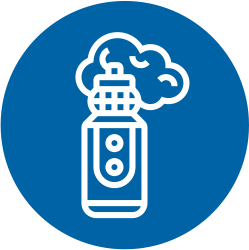
Next-Generation Products
New tobacco products are emerging, with many more choices available to consumers than just a few years ago. The Group offers manufacturers the fastest and most effective route to consumers in southern Europe, thanks to its extensive presence in each of its national markets and its expert market knowledge.
Logista actively participates in and supports the strategic transformation of the sector by offering consumers alternatives to traditional tobacco products, potentially with fewer health impacts.
In its capacity as the preferred distribution partner for these kinds of products, the Group also works to foster a responsible approach to how they are sold.














